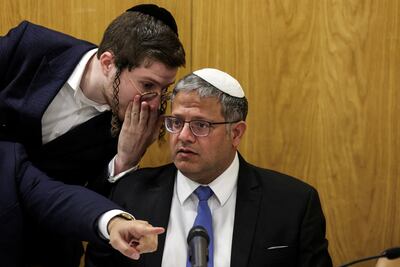Live updates: Follow the latest on Israel-Gaza
“Flag March is an abomination,” says Daniel Seidemann, a lawyer who has spent his life studying Jerusalem and its role at the heart of the conflict between Israelis and Palestinians.
He is deeply worried about Wednesday, when tens of thousands of Israelis will join the ultranationalist march through the most sensitive district of the city as part of events for Jerusalem Day, which commemorates Israel's full capture of the city in 1967.
“Every year it’s an abomination: the shouts of abuse, the raging through Al Wad Street, far-right Israelis pounding on doors behind which Palestinians are cowering,” Mr Seidemann adds.
“The police announcing they won’t do anything in response to chants, which include ‘death to Arabs’ and ‘may your villages burn’ and not one public figure in Israel condemning them.”
Mr Seidemann is speaking to The National the day before this year’s Flag March, which traditionally goes through the Muslim Quarter of Jerusalem’s Old City.
The route passes Al Aqsa Mosque – the third holiest site in Islam that many of the marchers want to replace with a third Jewish temple.
The event always causes extreme tension, not only for Palestinians but for people across the Middle East.

In 2021, tensions over the Flag March helped spark 11 days of fighting between Israel and Hamas.
This year it comes after nearly eight months of a far worse conflict in Gaza which has also dragged the occupied West Bank to the brink of explosion and pushed Israel and Hezbollah to the verge of war.
Jerusalem has stayed relatively calm, at least in comparison with the violence of these other arenas.
But there is a chance tomorrow's march might change that. If it does, the ramifications would be huge, Mr Seidemann says.
“This year is special circumstances. If I was asked to evaluate what the odds are of violence in Jerusalem, I would say it’s gone from 4 per cent to 8 per cent, so it likely won’t explode, but it’s far from impossible,” he says.
“If it does explode, that’s a regional war.”
Sami Abu Shehadeh, a Palestinian citizen of Israel and chairman of the opposition party Balad, says Jerusalem Day is “the most racist day on the Israeli calendar, because it touches the most sacred and sensitive issue for Palestinians: Al Aqsa Mosque”.
He believes far-right politicians in the current government, particularly National Security Minister Itamar Ben Gvir, want the day to spark a regional war.
“Ben Gvir is a pyromaniac and a very dangerous man for Israelis, Palestinians and the Middle East,” Mr Abu Shehadeh says.
Mr Ben Gvir vowed in an interview on Tuesday morning to go to the Al Aqsa compound on Jerusalem Day.
“I wish Itamar Ben Gvir was the only issue: a racist, crazy, pyromaniac. The problem is he’s a minister in the Israeli government, within which you don’t find anyone attacking his dangerous, racist behaviour,” Mr Abu Shehadeh says.
“It gives you a feeling that there is a consensus on racism and provocation.”
Mr Ben Gvir might be the politician most closely associated with the Flag March, but both Mr Seidemann and Mr Abu Shehadeh lay blame for the risk it poses at the feet of Prime Minister Benjamin Netanyahu.
“The decision of whether Ben Gvir is to go to Al Aqsa tomorrow is not his, it’s Netanyahu’s,” Mr Seidemann says.

“This is not something that any responsible government would allow to happen under these circumstances.”
Mr Seidemann stresses that Jerusalem has weathered other tense moments since the latest Gaza war began on October 7.
“There was another far-right march that was supposed to take place in December, but under high-level international pressure was cancelled. There was Ramadan, but that was kept calm. There are any number of dangerous episodes that have taken place. This is one of the more serious ones.”
Mr Abu Shehadeh feels that events have reached a point where the Flag March is unlikely to make things worse.
“There is nothing uniquely worse about Flag March. Terrible things have been happening every day since October 7. Not just in terms of war crimes in Gaza but all over the West Bank and Jerusalem. Palestinians are being killed daily. So I don’t expect tomorrow to be worse – the situation is already bad enough.”
Israel's police said they would deploy more than 3,000 officers for the march and that they “will act decisively against any attempt to disrupt order and law”.


